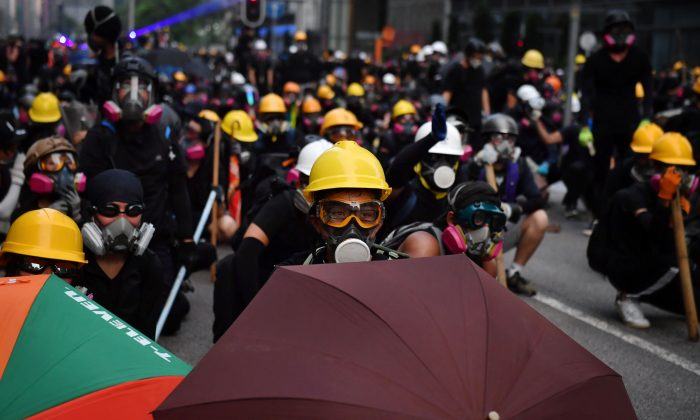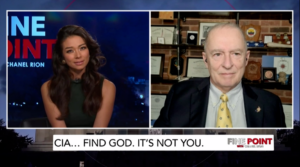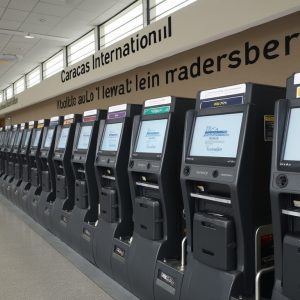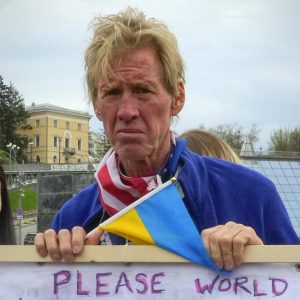Protesters with umbrellas and protective gear face off with riot police at Kowloon Bay in Hong Kong on August 24, 2019. LILLIAN SUWANRUMPHA/AFP/Getty Images
China remains largely inscrutable today, as its reputation from the past implies. Perhaps it’s worth making a point about how they view themselves.
For example, something I have never heard mentioned is the meaning of the flag of China, with its red background and five gold-colored stars in the upper left quadrant. The flag is widely believed to be the flag of China and is used as such, however, it’s not the flag of China—the flag represents the Chinese Communist Party (CCP), not the country of China itself.
This is actually fairly common in hard-left governments, and it’s commonly misunderstood. Similarly, the flag used by the Germans in World War II—with its red background and swastika—was not the flag of Germany, but the flag of the National Socialist German Workers’ Party, better known as the Nazis. The same applies to the flag used by the USSR, which had a red background with a hammer and sickle in the upper left quadrant.
This is a difficult concept for most of us in the West—who haven’t lived under such a regime—to truly understand. From the perspective of the CCP, and all of these aforementioned countries, everything and everyone belongs to the ruling regime. The CCP’s flag flying over everything symbolizes precisely that. This means that even the individual life of every Chinese citizen belongs to the Communist Party. Literally. Should the Party need a person to die for “the good of the Party,” it’s fully expected that the individual will willingly allow themselves to be killed.
Here in the West, the news reports that the problems in Hong Kong, the trade negotiations, and the updated F-16 fighter aircraft sales to Taiwan are separate issues. To the CCP, this isn’t the case. Their “Borg-like” perspective is that everything is one under the Communist Party, and resistance is futile.
By happy coincidence, President Donald Trump, as an experienced negotiator, is the perfect person to fix the situation with the CCP, which has been stealing billions of dollars from the United States as a matter of unchallenged routine. Trump correctly views China as a dangerous, gigantic, competitive corporation, in the form of a country that is acting extremely aggressively in its own interests and in direct opposition to ours.
We’re observing in the public bits and pieces of the president’s behind-the-scenes negotiations with China in a number of areas. In the West, these bits and pieces of a larger whole are generally incorrectly reported as separate, unrelated issues.
The situation began with Trump respectfully calling out the Chinese on the fact that they’ve been robbing us blind. He let them know that can’t continue and that they can still make money by negotiating an honest deal, although far less. Naturally, the Chinese have a hard time walking away from billions of free dollars and are pinning their hopes on ratcheting up the stakes, hoping to damage Trump before the next election and get back to stealing money under a different administration.
They still have many options for putting pressure on the Trump administration, although their tough stance on trade negotiations hasn’t been working, and Trump’s tariffs are badly damaging the floundering Chinese economy. Their economy is shrinking rapidly, while the U.S. economy is doing well and producing income from the tariffs, which will be used to offset any negatives.
Many observers have noted that the Iranians have been more aggressive of late on the world stage. But few have noted that the Iranians also depend on support from China. Their current aggressive stance is very likely a part of the Chinese overall response and an effort to pressure the Trump administration. The same can be said of the situation in Hong Kong.
The CCP has always intended to take full and unquestioned control of Hong Kong, and this must have seemed a golden opportunity.
As part of the CCP’s overall efforts to create pressure on the administration, we have also seen increased pressure on Hong Kong, which is, in fact, in contradiction to the agreement the CCP signed with regard to the rights of Hong Kong as a self-administered zone. This is certainly not an accident or coincidence, but is part of the U.S.–China negotiations.
Trump has slowly increased the level of his response, showing more and more support for the pro-democracy protesters in Hong Kong. He’s made it clear he doesn’t want to see a violent suppression of Hong Kong but hasn’t stated what his response would be, other than that a trade deal would be hard to come by. Fortunately, Western countries haven’t forgotten the 1989 Tiananmen Square massacre or the invasion and subjugation of Tibet.
Taiwan has always been a much more difficult target, but has also been on China’s target list to conquer and subjugate. The same for the absolute control of the South China Sea, which was going well for the CCP before the Trump administration. Now, with the large amounts of stolen money cut off, it’s not so affordable, and at least some portion of China’s ambitions and plans are being put on hold.
Part of Trump’s negotiations has been to continue to show a friendly approach to Taiwan, which recently culminated in the sale to Taiwan of 66 F-16 fighter jets. This is a nice boost to the Taiwanese military, although not profound, but certainly not liked by the CCP.
The CCP likes to remind the United States that it agreed to reduce arms sales to Taiwan in an unsigned 1982 communiqué; we need to remind them of their signed agreement to allow Hong Kong to govern itself.
Maybe an offer to sell Taiwan F-35 fighter aircraft would make for interesting negotiations.
Brad Johnson is a retired CIA senior operations officer and a former chief of station. He is president of Americans for Intelligence Reform.
Views expressed in this article are the opinions of the author and do not necessarily reflect the views of The Epoch Times.




